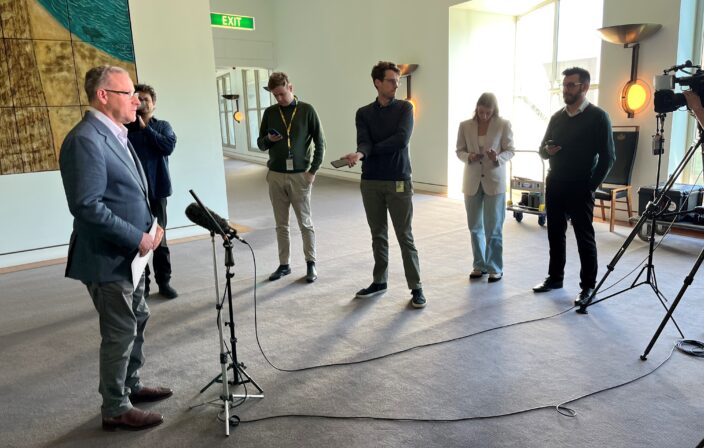Andrew McKellar interview with Kieran Gilbert, Sky News Afternoon Agenda
21 Nov 2022
|Transcripts
Event: Andrew McKellar interview with Kieran Gilbert, Sky News Afternoon Agenda.
Speakers: Andrew McKellar, chief executive Australian Chamber of Commerce and Industry; Kieran Gilbert, Sky News Afternoon Agenda.
Date: 21 November 2022.
Topics: Secure Jobs, Better Pay Bill; chamber network open letter to senators.
E&OE
Kieran Gilbert, host Sky News Afternoon Agenda: I’m joined live in the studio by Andrew McKellar. Andrew’s the chief executive of the Australian Chamber of Commerce and Industry. Andrew McKellar, thanks for your time. You really went right across the board today. Every major newspaper with ads, follow on stories too, saying basically an open letter to senators, don’t pass the laws as they are.
Andrew McKellar, chief executive Australian Chamber of Commerce and Industry: Well, that’s right, Kieran. What we’ve seen today is that all of the state and territory chambers of commerce have united with a very clear message to the Senate. Business has fundamental concerns with this legislation. It’s not fit to pass as it is. And we’re urging the Senate to look very carefully at it, to think about splitting the Bill. If they can’t do that, then don’t pass it as it stands.
Kieran: When you say split the Bill, what would you be supportive of passing?
Andrew: I think there are parts of the Bill that go through issues of gender pay equity, that go to how things are dealt with in the low paid sector, so in the care sector and possibly some other areas. If that’s adequately defined, then really I don’t think business has fundamental issues with any of that. The area where we have a big problem with is this so-called multi-employer, single interest stream. And in particular the impact there for small and medium-sized businesses. So, if you could split that part out from the rest of the Bill, that’s one way to approach it.
Kieran: Is it fundamentally the way that small business is defined in the Bill, is that your key concern? In terms of the size?
Andrew: That’s part of it. That’s one part. So certainly, small business is not protected from this. It’s very far-reaching legislation. We think that it really goes to the fact that this is a fundamental change in the way in which bargaining is approached in Australia. It reverses 30 years of reforms, takes us back to a period of the late 1980s, early 1990s. It would be a backward step. And ultimately, our concern is that the Bill won’t achieve what it sets out to achieve. So, the government is saying they’re doing this because they want to see higher wages. In fact, there’s no evidence at all that they’ve been able to produce that supports that claim.
Kieran: If they were to lift the bar for what a small business is considered under this legislation from 15 to say 50 or 100, would you be more willing to support it?
Andrew: Look, I think that’s only one aspect, and of course we do want to see small business protected in this situation. They don’t have all the resources that a big business has in terms of that process. But really, it’s much more fundamental than that. We really think that they need to split out that whole so-called multi-employer single interest stream. Otherwise, it’s just not going to work.
Kieran: Is one of the fundamental problems you have with it is this veto that unions would have over any such deal?
Andrew: That’s another part. Again, this is something that’s been even strengthened in the amendments that the government has brought in the House of Representatives. Obviously, that’s an area of concern, that you don’t want to be handing over control in your business, or even away from your employees. So to give third parties, whether it be the union or whether it be the Commission, much greater say in what’s determined at the workplace level. Really, that’s not ideal.
Kieran: What’s your advice from the Senate crossbench? Are you feeling hopeful that they won’t allow this through the upper house?
Andrew: Obviously, we’re beating a path to their door. Everybody is knocking on their door, trying to convince them about what the problems are with this legislation. Ultimately, we’re in their hands, and I think this is a fundamental challenge for the Australian economy, where we are relying on the Senate and the parliamentary process to work. The regrettable thing here is that the government hasn’t taken on board the comments. It hasn’t followed a process where they’ve really tried to get consensus around this issue. They’re rushing it through. They’re trying to jam it through the Senate. We don’t think that’s a good outcome at all.
Kieran: The prime minister says every time Labor and the unions seek to put upward pressure on wages, business groups and others warn the sky’s going to fall in, and yet it never does. That’s his argument today. It looks like he’s not going to back down on this push. Are you concerned by that language?
Andrew: Well, I don’t agree with it to start with. I mean, I think if you look back over the history, if you go back to the time when enterprise bargaining was first instituted, business supported, that reform. That’s back in the days of the Hawke and Keating government, a Labor government. So it is achievable that you can get business consensus around that kind of reform. This particular Bill takes us in completely the opposite direction, and that’s why business opposes it.
Kieran: They still say that enterprise bargaining is the first priority, and for any business that has EBAs, they aren’t able to access multi-employer. So that’s still their fundamental principle, and that there would be a grace period of six months after any EBA expired for another discussion to start. Not conclude, just start. Doesn’t that show their fundamental principle is still on that EBA?
Andrew: In fact, our analysis is different to that. From what we can see in the way the Bill’s drafted, this will fundamentally change the way in which bargaining is undertaken in the Australian economy. The risk is, without fixing the fundamental problems on enterprise bargaining, that will continue to wither on the vine. And this opens the door for this new multi-employer approach to become the norm.
Kieran: Andrew McKellar, we will see what the crossbench does, and whether or not the government is successful at getting this through by Christmas. I appreciate your time. Thank you.
Andrew: Thanks, Kieran.


